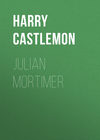Loe raamatut: «No Moss: or, The Career of a Rolling Stone»
CHAPTER I.
FIRE QUARTERS
"Four bells, sir!" reported the messenger-boy, to the officer who had charge of the deck of the Storm King.
"Very good. Quartermaster, make it so."
The silvery tones of the little bell rang through the vessel, and immediately there began a great noise and hubbub on the berth-deck, which, but a moment before, had been so quiet and orderly. Songs, shouts of laughter, and noises of every description, that can be made only by a lot of healthy boys just turned loose from their studies, arose through the hatchway, and presently the crew came tumbling up the ladder. The foremost held a guitar under his arm; the one that followed at his heels brought a checker-board; a third had a box of dominoes; and the boy who brought up the rear carried a single-stick in each hand, and went about challenging every one he met to a friendly trial of skill. Some of the crew walked aft to converse with their officers; the boys with the checkers and dominoes seated themselves on deck to engage in quiet games; he of the single-sticks very soon found an antagonist; and the sailor with the guitar perched himself upon the heel of the bowsprit, and, after tuning his instrument, cleared his throat, preparatory to treating his companions to a song containing the information that he had at one time "Sailed in the good ship Bessie."
The second dog-watch (the hours from six until eight in the evening) was a season of recreation with the students attached to the Storm King, and they never failed to make the most of it. A first-class boy, or an ordinary seaman, could then walk up to the executive officer and challenge him to a contest with broadswords, without committing any breach of discipline; and the first lieutenant could talk sociably with his men, with no fear of being brought before the principal and reprimanded for unofficer-like conduct. The boys played, sang, ran races through the rigging, swung Indian clubs and dumb-bells, and, of course, yelled all the while at the top of their lungs.
The Storm King had now been in possession of the principal of the academy about two months, and was every day growing in favor with the students. Indeed, the addition of a navy to the academy bid fair to cause some radical changes in the programme of studies, for military honors were at a heavy discount, and all the students were working for positions on board the yacht. No one cared for the colonel's silver eagle now, but every body cast longing eyes toward the anchors he wore in his naval shoulder-straps. The little vessel had had at least one good effect. She had put ambition into the boys, elevated the standard of scholarship, and convinced such lazy fellows as Martin, Rich, and Miller, that they must pay more attention to their books, or be left behind by every student in the academy.
The yacht was in commission now: the Stars and Stripes floated from her peak, and strict naval discipline had been established. She mounted a "Long Tom" amid-ships, in the shape of a six-pounder pivot gun; and on the berth-deck was an ample supply of small arms, consisting of cutlasses, pikes, pistols, and muskets. The crew numbered twenty boys, including captain, lieutenants, masters, midshipmen, warrant and petty officers, and seamen. They were dressed in the uniform of the United States navy; and the first lieutenant, whose whole soul was wrapped up in his duties, had drilled them until they were as handy and expert as the crew of any man-of-war.
The boys never grew tired of their work: they were passionately fond of this new branch of the service, and their efforts to perfect themselves in every department of their duties were amusing, and sometimes ridiculous. On one occasion, a frigate came into the harbor and anchored a short distance from the Storm King. Instantly the students were on the alert, for that was the time to learn something. Captain Steele ordered his executive to follow the man-of-war in striking the time of day; and this show of respect very soon attracted the attention of the commodore, who, in the afternoon, put off in his gig to visit the Storm King, where he was piped over the side, and received with all the ceremony due his rank. The students obtained liberty, visited the vessel, talked with the old tars on the streets, and the result was soon apparent: the boat's crew began to pull the regular man-of-war stroke; the seamen took to wearing their caps on the back of their heads, hitched up their trowsers with their elbows, grumbled in the most approved sailor fashion when any thing went wrong with them, and, when they walked, they rolled from side to side like vessels in a gale of wind. They remembered all the sea-phrases they heard the old tars use, and never failed to bring them in on all proper occasions. It was certainly laughable to hear a fair-haired little fellow exclaim, "Sink my tarry wig!" whenever he heard any thing that astonished him.
The boatswain's mate of the yacht made friends with the boatswain of the frigate, put himself under instructions, and soon learned to use his whistle with wonderful skill, and to issue his commands in a voice which seemed to come all the way up from his boots. And then, when he gave an order, he would hasten obedience by such expressions as – "Rouse a bit, there!" and "Make a break, now, bullies!" In short, before the frigate left the harbor, the young sailors had made great improvement in all the minor branches of their profession, and often told one another that their rivals at the academy had a good deal to learn before they could make the crew of the yacht take back seats.
Harry Green was still executive officer of the Storm King. The Court of Inquiry, which he had requested in his report of the attack made on the yacht by the Crusoe band, had been held, and the lieutenant came off with flying colors. The only particular in which he had failed to carry out the orders of his superior officer was in permitting the governor to escape: but that was something he could not prevent. Sam, in his desperation, had jumped overboard before the students could get near enough to seize him; and Harry had but little difficulty in proving, to the satisfaction of the Court, that not only was it impossible to pick him up, but that the attempt to do so would have endangered the vessel and the lives of his crew. Of course, when Harry was cleared, his officers and men were cleared also, and allowed to retain their positions on board the yacht, much to the disappointment of their rivals, who wanted to man the vessel themselves. But, after all, the escape from disgrace had been a very narrow one – so much so, in fact, that the only thing that restrained the students from venting their spite upon the projector of the attack – Tom Newcombe – was the fear of a court-martial, and dismissal from the navy. They were all highly enraged at Tom, and, one day, two of the seamen stopped him on the street, and told him that if he ever got another idea into his head about that yacht and attempted to carry it out, they would certainly duck him in the harbor. The interview took place in front of Mr. Newcombe's residence. Tom wisely held his peace, and made no reply to the young sailors' threats until he was safe inside the gate, when he drawled out:
"Didn't I tell you that, if I did not own and sail that yacht, nobody should? Well, I meant it. I've got another idea."
The young tars, being well acquainted with Tom, understood the meaning of this declaration, and hurried off to report the matter to the first lieutenant. Harry listened with evident uneasiness, and, after taking a few turns across the deck, went ashore to consult Captain Steele.
"If it was any body else in the world," said the executive, after he had told his story, "I should laugh at it; but, coming from the source it does, I know it is no laughing matter. Newcombe has given us abundant proof that he is a reckless, bull-headed rascal, and, if he once gets an idea, he sticks to it, and one might as well talk to the wind as to attempt to reason with him. I can not imagine what new scheme he has got into his head, but I am satisfied that the yacht is in danger. What a pity it is that that boy does not spend the time he wastes in studying up plans for mischief, upon his books! he would soon be the best scholar of his age in the village."
Captain Steele, as may be imagined, was not at all pleased with the information he had received. He was afraid of Tom, and he did not hesitate to tell his lieutenant so. He could not, of course, determine where the threatened danger was coming from, but he was as firmly convinced as was the executive that trouble was brewing in some quarter. He could only order his subordinate to keep a bright lookout at all times, especially at night.
"I'll do that," soliloquized Harry, as he returned to his vessel, "and if Tom Newcombe comes around the upper end of this harbor with any more Crusoe bands, he'll not escape as easily as he did before. I don't want to see him hurt, because his father gave us that vessel, but I'll teach him that I am tired of living in constant fear of having the yacht destroyed and my commission revoked."
This incident happened about two weeks before the commencement of our story, and, during that time, an event occurred that caused considerable excitement in the village, and relieved the lieutenant of a great load of anxiety. It was the sudden and mysterious disappearance of the members of the Crusoe band. Tom Newcombe went up to bed, one night, as usual, and, the next morning, he was gone; and so was his shot-gun, and fishing-tackle, and a good portion of his clothing. Xury, Jack Spaniard, Friday, and Will Atkins were also missing; and, what was more, nothing had ever been seen or heard of them since their departure. They had disappeared as completely as though they had never existed at all. The event had been a nine-days' wonder, but now nearly every one, except the students, had ceased to talk about it. Their curiosity had been aroused, and they left no stone unturned in their efforts to find the means of satisfying it. They made inquiries of every body, guessed, wondered, and speculated, but all to no purpose; for even the talkative Tom Newcombe had left the village without giving any one so much as a hint of his intended movements. On the evening in question, some of the crew started the all-absorbing topic by saying, as they had probably done twenty times before, that they could not imagine what had become of Tom, or what his object could have been in running away. As far as the object he had in view was concerned, Harry also confessed ignorance; but said he believed Tom had started with the Crusoe band for the North Pole. The boatswain was sure that he was on his way to South America; and one of the quartermasters thought his face was turned toward the Rocky Mountains.
"Now, fellows, I'll tell you all about it," said Jackson, who, if he ever forgot the Crusoe men, had only to look at his hand, which bore a long, ragged scar from the wound made by the bayonet that had been thrust through it: "In the first place, imagine the most impossible enterprise in the world – something that nobody but Tom Newcombe would ever think of attempting; in the second, make up your minds which is the most outlandish place on the globe; then put the two together, and you have the key to his last movement."
"I wonder if he is the leader of the expedition!" said one of the midshipmen; "perhaps Sam Barton has turned up again."
"Impossible! he could not have lived two minutes in those waves."
"Well, we know one thing," said Harry; "and that is, we are rid of our arch enemy, and the yacht is safe. But I would give something to know what his new idea was."
"Quartermaster, strike eight bells," said the officer of the deck.
The movements that followed this order, showed how successful the lieutenant had been in his efforts to establish discipline among the noisy, fun-loving boys who composed his crew. Scarcely had the bell been struck, when the desperate broadsword fight, that had been going on on the forecastle for the last quarter of an hour, was brought to a close; dumb-bells, Indian clubs, and checkerboards quickly disappeared; the star-gazers came down out of the rigging; the quartermaster once more put his spy-glass under his arm, and began planking the deck; and quietness and order took the place of the confusion and noise that had reigned supreme a moment before. The hammocks were piped, the anchor watch set, the boatswain's whistle was heard again, followed by the injunction, "Keep silence, fore and aft!" and the crew of the yacht was disposed of for the night. The officers went into the cabin, and those who were to stand watch that night soon turned in; while the others, never forgetting the rivals on shore who were working night and day to dislodge them, resumed their books. On the berth-deck the lights were turned down too low to admit of study, the rules forbade conversation, and the only thing the students could do was to tumble into their hammocks.
"Now, then," whispered the boatswain's mate, as he settled himself comfortably between the blankets, "I wonder if that lieutenant will allow us to sleep in peace to-night. He hasn't called us up to put out a fire for two weeks."
Among other things in which Harry had drilled his men until they were almost perfect, was fire quarters; and he had rung so many alarms that the students began to call him the "fire lieutenant." Of course he never took them away from their studies, but he had an uncomfortable habit of calling them up in the night. Harry sometimes pored over his books until nearly twelve o'clock; and when every one, except himself and the officers and men on watch was asleep, he would come out of his cabin and ring the ship's bell as if his life depended upon it. The crew would tumble out of their hammocks and hurry to their stations, some manning the pump, and others getting out the hose and buckets, and all of them growling lustily to themselves, because they knew there was not a spark of fire on board the vessel. These false alarms, although annoying to the students, had the effect of making them thoroughly posted in their duties; and Harry was satisfied, that if, by any accident, his little vessel should really catch on fire, the practice the crew had had would enable them to save her. He afterward had reason to congratulate himself that he had been so particular on this point.
At one o'clock, every one on board the Storm King, except the officers of the deck, quartermaster, and the two seamen who stood the anchor watch, was sound asleep. The night was very dark – so dark that the watch did not see a skiff which approached the vessel, propelled by slow, noiseless strokes. But the skiff was there, and, when it had been brought alongside the yacht, the bow-oarsman arose to his feet, and fastened into the fore-chains with a boat-hook, after which, a figure in the stern sheets placed his hands upon the rail, and drew himself up until he had obtained a view of the vessel's deck. He could not see much on account of the darkness, but his ears told him that the presence of himself and companions was unsuspected; and, having satisfied himself on this point, the visitor, whoever he was, clambered carefully over the rail, and a moment afterward was crouching on deck at the head of the ladder which led down into the forecastle.
"What's that?" exclaimed one of the watch, suddenly interrupting the story he was relating to his companion.
"I didn't hear any thing," replied the other.
"Well, I imagined I did. Every dark night that I stand watch, I think of the Crusoe band."
"O, they're a hundred miles from here by this time – perhaps more. Go on with your yarn."
The young sailor listened a moment, but as the sound which had attracted his attention was not repeated, he resumed his story; whereupon, the figure at the hatchway arose to his feet, and stealthily descended the ladder. He was gone about five minutes, and then re-appeared, crawled noiselessly across the deck, and had just placed his hands upon the rail, when he was discovered by one of the watch.
"Hallo! Boat – ship – I mean, man – ahoy!" shouted the young tar, evidently at a loss to determine how he ought to hail a stranger found on deck of his vessel, under such circumstances.
Both the watch made a rush for the mysterious visitor, who disappeared over the rail like a flash; and, by the time they reached the side, he was in his boat, which was moving off into the darkness. But he did not get away in time to escape recognition by the watch, both of whom stood for an instant as if petrified, and then called out, in amazement and alarm,
"Tom Newcombe!"
"Where?" exclaimed Jackson, the officer of the deck, hurrying forward.
"In his boat there, sir, with half a dozen other fellows. He has been on board the vessel; we caught sight of him just as he was climbing over the rail."
The officer was thunderstruck. The presence of their evil genius at that hour, and under such circumstances, boded no good to the yacht and her crew, and, for a moment, Jackson stood holding fast to the rail, imagining all sorts of terrible things. He would not have been astonished if the waters of the harbor had suddenly opened to swallow up the vessel and her sleeping company. He even thought he felt the deck rise under his feet, and held his breath, expecting to hear an explosion, and to find himself struggling in the water amid the wreck of the Storm King. But nothing of the kind happened: the yacht remained right side up; and if Tom Newcombe had placed a barrel of gunpowder in her, with a slow-match attached, intending to blow the vessel and her crew to atoms, there might yet be time to frustrate his designs.
"Quartermaster, spring that rattle!" shouted the officer, as if suddenly awaking out of a sound sleep – "Smith and Simmonds, lower away the jolly-boat."
Jackson ran below to report the matter to the first lieutenant; the sailors hurried off to execute their orders; and, before Tom Newcombe and his companions were out of sight of the yacht, they heard the rattle calling the crew to quarters.
"Wake up, sir," cried Jackson, roughly shaking his superior officer by the shoulder – "Tom Newcombe!"
The second lieutenant knew that the mention of that name would arouse the executive sooner than any thing else.
"Mercy on us!" exclaimed Harry, "you don't say so! Where is he?"
"In his boat, now, and going down the harbor at the rate of ten knots an hour. He has been on board this yacht doing some mischief, of course, and I am expecting every instant to find myself going to the bottom. His pirate crew is with him."
"The Crusoe band!" Harry almost gasped.
"There are several fellows with him, and I don't know who else they can be."
"Call away the jolly-boat, and man her with an armed crew," said Harry. "Mr. Richardson!"
"Here, sir," answered the midshipman, who had just come into the cabin with his boots in one hand, and his coat in the other.
"Take charge of the jolly-boat, pursue those fellows, and capture them, at all hazards, if they can be found. Mr. Jackson, stand by to get the vessel under way immediately."
The second lieutenant sprang up the ladder, followed by the midshipman, and, a few moments afterward, Harry heard the boat's crew scrambling over the side, and the boatswain's whistle calling the men to their stations.
"Am I doomed to live in constant fear of that fellow as long as I remain at the academy?" said the first lieutenant to himself. "What could he have wanted here? I'll have the yacht searched at once, and discover, if I can, what he has been up to."
But the executive soon learned that it was not necessary to search the vessel to find out what Tom Newcombe had been doing, for, just at that moment, he was alarmed by the rapid tolling of the bell, and Jackson burst into the cabin, pale and excited.
"The yacht is on fire, sir!" said he.
Harry, too astonished to speak, hurried on deck, and, to his consternation, saw a dense smoke arising from the fore-hatchway. The students did not grumble now at being called to fire-quarters, for this was not a false alarm; the inside of the galley was a sheet of flames.




















